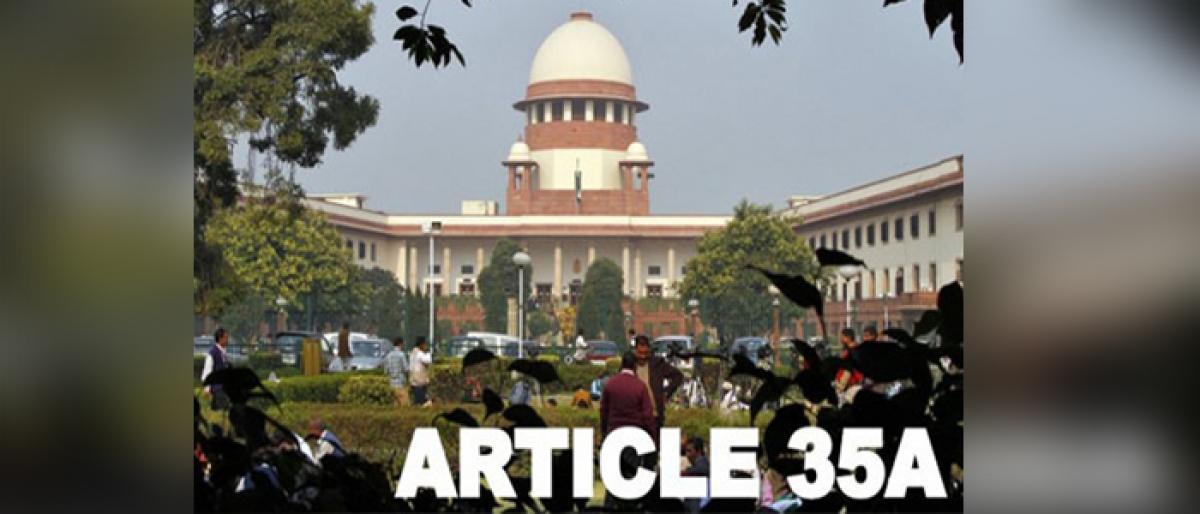Live
- Nizamabad MP Dharmapuri Arvind and Jagtial MLA Dr. Sanjay Kumar Meet CM Revanth Reddy
- Hyderabad CP CV Anand Issues Stern Warning to Bouncers
- MP Laxman Criticizes Police Conduct, Calls for Support for Victims' Families
- Fire Breaks Out in Kachiguda-Chennai Egmore Express, Passengers Evacuated Safely
- CM Revanth Reddy Condemns Attacks on Film Personalities' Homes, Calls for Strict Action
- Victory Venkatesh and Nandamuri Balakrishna to Set Screens on Fire with Unstoppable Season 4
- Over 71.81 crore Ayushman Bharat Health Account numbers generated: Centre
- In special gesture, Kuwait's Prime Minister sees-off PM Modi at airport after conclusion of historic visit
- Veer crowned PGTI Ranking champion, Shaurya wins emerging player honour
- Sr National Badminton: Unseeded Rounak Chauhan, Adarshini Shri reach singles semis
Just In

A fresh plea was moved in the Supreme Court on Friday challenging the constitutional validity of Article 35A that empowers the Jammu and Kashmir assembly to define permanent residents for bestowing special rights and privileges to them
Fresh plea in SC challenges its constitutional validity
New Delhi: A fresh plea was moved in the Supreme Court on Friday challenging the constitutional validity of Article 35-A that empowers the Jammu and Kashmir assembly to define "permanent residents" for bestowing special rights and privileges to them.
The petitioner, a non-governmental organisation (NGO) 'Ikkjut Jammu', sought quashing of the provision which has been challenged by several others, including civil society groups, individuals.
There have also been petitions supporting the retention of Article 35-A of the Constitution.
The fresh petition, filed through advocate Sumit R Sharma, says that Article 35-A furthers "two nation-theory which is against the theory of secularism".
"It is an enabling provision for the creation of a theological state within secular territory of India. It ensures that the character of J&K's Legislative Assembly shall remain Islamic," the petition stated.
It added that Article 35-A provides absolute powers to the Jammu and Kashmir's legislative assembly to infringe the fundamental rights of Indian citizens.
Earlier this month, the Jammu and Kashmir National Conference (NC) had moved the apex court in support of Article 35-A.
The NC had said that the Article serves as an important link between the state and the Union and its people and serves to maintain a fine balance of constitutional federalism.
The apex court is already seized of a batch of petitions in the matter, including the one filed by NGO 'We the Citizens' seeking quashing of the article, which confers special status to permanent residents of Jammu and Kashmir.
The NC's intervening application, filed through advocate Adeeba Mujhaid, had sought intervention in the 'We the Citizens' petition, saying that the challenge raised in the pending writ petition suffers from gross delays and latches and being raised after more than 60 years and cannot be maintainable.
"Any attempt to tinker with the said balance would ruin the fabric of the federal structure envisaged under the Constitution and jeopardise the avowed special status guaranteed to the state of Jammu and Kashmir, thereby landing a devastating fatal blow to the state and its probe," the petition filed by NC through its provincial president Nasir Aslam Wani had said.
On July 31, CPI(M)'s J-K unit had moved the apex court and said in its petition that it was of the unequivocal opinion that the Article shall in "no circumstance be annulled, modified or repealed".
On May 14, Attorney General K K Venugopal had informed the apex court that the Centre's interlocutor for Jammu and Kashmir is currently discussing with all stakeholders the "sensitive" issues relating to the challenge to Article 35-A of the Constitution.
Dineshwar Sharma, former director of the Intelligence Bureau (IB), was appointed as the Centre's interlocutor for the state on October 23 2017.
Article 35-A, which was incorporated in the Constitution by a 1954 Presidential Order, accords special rights and privileges to the citizens of J&K and denies property rights to a woman who marries a person from outside the state.
The provision, which leads such women from the state to forfeit their right over property, also applies to their heirs.
Several interlocutory petitions have also been filed in support and against of Article 35-A by various individuals and civil society groups.
Earlier, the Jammu and Kashmir government through its standing counsel Shoeb Alam, had referred to two judgments by the constitution benches of the apex court and said the issues raised in the pleas challenging Article 35-A were already covered by these verdicts.
The state government, while defending Article 35-A, had cited two verdicts by the constitution benches of the Supreme Court in 1961 and 1969 which had upheld the powers of the President under Article 370(1)(d) of the Constitution to pass constitutional orders.
The article was incorporated in the Constitution in 1954 by an order of president Rajendra Prasad on the advice of the then Jawaharlal Nehru Cabinet.
It empowers the state legislature to frame any law without attracting a challenge on the grounds of violation of the right to equality of people from other states or any other right under the Constitution.
The apex court had on August 14, 2017 said a Constitution bench may examine whether Article 35-A was gender-biased and violative of the basic structure of the Constitution.
The state government had earlier said the issue has already been "prima facie settled" by a full bench of the High Court in its verdict in 2002.
In the case, the high court had, by a majority view, held that a daughter of a permanent resident of Jammu and Kashmir marrying a non-permanent resident will not lose the status of a permanent resident.

© 2024 Hyderabad Media House Limited/The Hans India. All rights reserved. Powered by hocalwire.com







